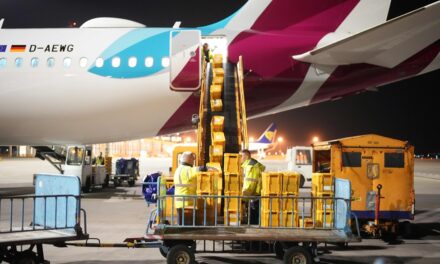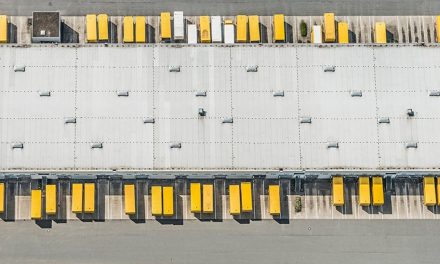
Getting the package home.
As the managing director of DHL in Israel, Dan Granot has one recurring headache – last mile delivery to residential areas. The problem with delivering packages to homes, he discovered, was that his deliverymen worked during office hours and so did the recipients of the parcels. Seventy-five percent of the time, a deliveryman would have to drive out two or three times before he could finally get the parcel delivered. This cost the carrier a great deal of time and money. The carrier subsidized each trip and was losing large amounts of money on residential areas.
Last summer, Granot – who founded delivery company Shigur Express – decided to try to solve this problem together with Nir Kinory and Yoav Koster. The result is eShip-4u, a start-up company that has developed a convenient hardware and software solution that solves the problem of last mile delivery.
eShip-4u's solution is an ADM (automatic delivery machine) that measures 2 meters by 1.5 meters, and can be situated in any location, from a post office to a mall, a train or bus station, or even a petrol station. Carriers bring their parcels and deliver them to the ADM. The parcels are placed in crates, which are divided into separate units or cells. The person is then notified either by telephone, e-mail or SMS to come and pick up their parcel within a set period – probably of some days.
Each ADM has six different crates, which can be used by different carriers, such as Federal Express, UPS, or the Postal service. No carrier can gain access to another crate. Each ADM has about 180 cells of varying sizes, so it can hold up to 180 parcels at a time. Granot believes that in the city or suburbs there should be one ADM to about 5,000 to 10,000 inhabitants, in rural areas the number of users will be reduced.
The consumer can pick up the parcel at any hour, seven days a week. All they have to do is go to the ADM, and insert a special smart card. A special window in the ADM then opens up to let you take your parcel. The window is adjustable to the size of the cell in which your parcel is sitting, ensuring that no one can steal other parcels stored within the ADM.
This system clearly offers price-savings for carriers. But why does it help the consumer? Simple. The idea is that if the carriers save money on delivery, they will share part of that money with the consumers, reducing prices accordingly.
The system should also be convenient, because it is placed in a central location where it can be picked up easily; and it gives added security. In the US in particular, many householders prefer not to have strange men – even postmen – knocking at their doors when they aren't at home.
Each ADM is controlled by the Last Mile Server (LAMS), a networking system that controls the administrative and technological functions of the ADM. The server controls and monitors the entire shipment process, from the moment the parcel is received, to the moment it is picked up by the consumer.
Carriers can receive information about shipments and the number of cells occupied in any given ADM in the network. The software also keeps track of packages after their arrival at the ADM. If they are not picked up in time, or the recipient decides to return it to the sender, the server notifies the carrier. It also notifies technicians of technical problems.
FOLLOWING A small trial at a Paz garage near Herzliya Pituah, eShip is about to begin wider trials of its solution in Germany with the country's national postal carrier Deutsche Post. The company is supplying 12 ADMs, which are to be located in post offices, train stations, gas stations and other central locations in Minz and Dortmund.
The trial is aimed at two different sectors – B2B (Business to Business), and B2C (business to consumer). The B2B trials begin on November 15. Companies like HP, Siemens, and Bosch need to get parts to their technicians or engineers every night, usually to their trucks or lorries, so that in the morning they will have all the necessary parts to repair or service goods. This is inefficient since the truck is not always in the right place at the right time.
Using the eShip-4u system, parts can be delivered to the ADM at night and the technicians can pick them up first thing in the morning. "You really need 40 to 50 ADMs in a city to really serve the community but it still gives you an idea if the system is workable or not," says Granot.
The second trial begins in January. Most parcels sent through the post to consumers come from online suppliers such as Amazon, or from catalogues.
The German trials are extremely significant for eShip. Deutsche Post is one of the largest logistics companies in the world. It owns companies in every European country, including DHL, and 18,000 post offices in Germany.
"This is a very important client for us," admits Granot. "If the trials go well Deutsche Post will probably order thousands of units. It will mean big business."
It is also important because other carriers will be looking to follow Deutsche Post's lead since the German carrier is often at the forefront of technological developments The flip side, however, is that if Deutsche Post doesn't like the eChip service , then the start-up will find it harder than ever to sell its solution to other carriers.
eShip-4u began operating last summer and in September received financing of $3.8 million from two small angel investors, and two venture capital companies, Veritas Venture Partners and Yozma Group. The company, which today employs 27 people, has raised a further $2m. from the existing VCs, and hopes to raise another $3m. before the end of the year, as part of the same financing round.
Raising money is not easy, however. "People think 10 times before spending their dollars. But we are optimistic and expect to get the money we need," says Granot.
The market for last mile delivery in residential areas was estimated at $1.2 billion in 2000 in the US alone and is likely to rise to $4b. by 2004. Worldwide the market is expected to reach $10b. by 2004.
Granot is sure that eShip can grab a large share of this market, a belief that is reflected in the company's sales targets for the years ahead. This year Granot expects to see $500,000 in sales, $5m. next year, $15m. the following year, and reach $50m.
by 2005. This sounds optimistic, bordering on unlikely, particularly in today's depressing economic environment, but Granot asserts that his figures are "rather conservative."
The ADMs are expensive. Each one costs $50,000, though, Granot says, the price will decrease according to the number a carrier buys. "We have shown carriers our figures and they are very surprised to see that the time it takes for return of the investment is pretty short," says Granot.
"The thing about eShip's solution is that the more ADMs that are placed in a city or town, the sooner people will be able to appreciate the service, the more they will use it," says Granot. "And the more packages that go in and out of the ADM, the shorter will be the return on investment."
Initially eShip-4u's aim was to target the US market first and then look towards the European one. But Deutsche Post's interest led them to change their priorities. "We were amazed at the speed with which Deutsche Poste made its decision," says Granot. "We met them first in February and by June we were already involved in trials with them."
After meeting with US carriers, Granot realized that they were not responding quickly enough for eShip-4u's time scale. In an effort to speed things up, the company began working with global management and technology consultancy firm Booz-Allen & Hamilton. "Through them we have made connections with several important companies in the US and also in Europe," says Granot who believes that by the second quarter of next yearl, trials will begin in the US.
THE NEED for speed arises also because of competition. At present, Granot insists that there is little direct competition, but admits that it will not be long in coming.
One existing competitor is Northrup Grumman, a postal delivery solutions company traded on the New York Stock Exchange, which was originally founded by UPS and has a similar system. Granot points out that eShip beat Northrup Grumman in the Deutsche Post trials.
Another competitor, US company ToolBox, which offered an electronic mail box solution for the home, has already collapsed. For 15 months the company was eShip-4u's biggest competitor in the US market, and it won a major contract with UPS. Few weeks ago, however, it went bankrupt.
Another company that offered a parcel service from petrol stations, also failed. "There was no synergy," says Granot. "The guy in the petrol station can fill your car, but he can't handle packages." Other competitors include zBox, which has developed a smart box, and ShopperBox, which is offering electronic lockers.
"It takes time," says Granot. "Not only to develop the system but to market it and build up a real service. If Deutsche Post doesn't buy eShip's solution, then you won't see another one before 2003." There have been many failures and eShip is now in a very critical period. "We have to get one big customer in a very short period of time," admits Granot.
The pilot at Deutsche Post ends in the first quarter of 2002. If this is a success and the German carrier decides to buy, then eShip has passed its first main obstacle. "People want to see that our system creates real value for them. If we are successful with Deutsche Post then most European post offices will be open to us." If eShip fails to convince the Germans, however, and at the same time fails to interest US carriers, it could become the next statistic.
World Reporter All Material Subject to Copyright













